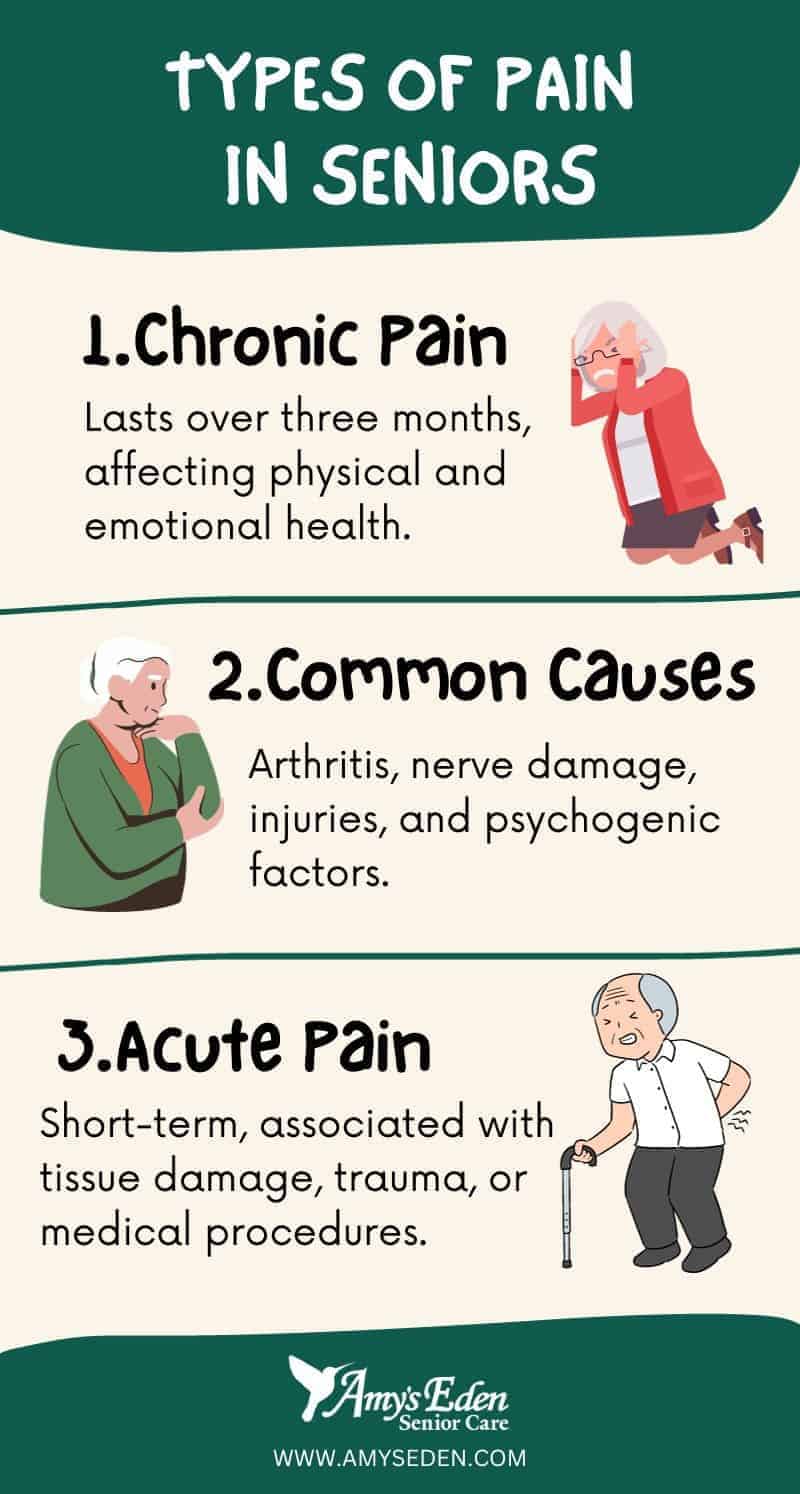
When a loved one is severely ill, the family has two care options: palliative care or hospice care. While there are similarities between the two, palliative care is often the default for patients with end-stage conditions that may still be cured or treated to improve. Learn more about palliative care and how it can help with pain management.
Understanding Pain and Palliative Care
Painful symptoms trigger the need for palliative care. If a loved one is experiencing pain as a symptom of their illness, the health care provider may recommend forming a palliative care team to assist them in pain management.
What is pain management?
Pain management is a medical approach where the healthcare team works together to reduce the patient’s discomfort. The symptoms of serious conditions can often be extremely painful, leading to anxiety, emotional distress, and a depreciating quality of life.
The care team employs various methods to alleviate pain, such as therapy, medications, and lifestyle changes. By minimizing suffering, the patient can have a better quality of life while enhancing their functionality.
What is palliative care?
Palliative care is a specialized medical care provided to people with terminal illnesses. The patients receive assistance with daily living and functionalities, emotional support, and care for their spiritual needs — so do their families.
By taking a holistic approach to care, palliative caregivers, nurses, and doctors can help your loved one go through the symptoms less painfully. There’s also a chance their condition may improve or their disease can be cured. Many patients who receive palliative care can reclaim their life back due to the compassionate and constant support of the palliative care team.
The role of palliative care in pain management
Palliative care is not about providing compassionate support for the dying. Although most patients receiving this type of care have late-stage diseases, pain management is the priority of palliative help.
The providers combine medications, psychological counseling, and various therapies to reduce the patient’s aches, soreness, and other discomforts. As each person has varying pain tolerance levels and responses to interventions, providers ensure that pain management strategies are personalized to improve their quality of life.
Types of Pain in Seniors

Pain can be categorized into two levels — chronic and acute. Learn more about what differentiates the two.
1. Chronic pain
Chronic pain refers to the discomfort that lasts for an extended period, specifically when it lasts for more than three months. This type of pain is often a result of conditions like arthritis and nerve damage that affect the patient’s physical and emotional health.
It can be debilitating because it’s ongoing and can affect the patient’s sleep, daily activities, nutrition, and other life aspects. These consequences can cascade into other domains of health, leading to worsening outcomes, such as comorbidities with mental health problems.
Those with chronic pain are at a high risk of psychological concerns, such as depression, sleep trouble, and anxiety.
Common causes and conditions
Chronic pain affects about 50 million Americans. There are several causes of chronic pain. Sometimes, it starts with an injury like a fall and even after recovering from it, the pain persists. Other times, it’s related to health conditions, such as arthritis or cancer.
Chronic pain may be “on” and “off” or ongoing, depending on the underlying factor. Another unique case of chronic pain is a response to psychogenic pain or psychosomatic pain.
It occurs not by physical illness or injury but by psychological factors, such as anxiety, stress, and depression. Health experts believe this phenomenon develops due to the insufficient levels of endorphins in the blood, which are chemicals that promote positive feelings.
In some instances, causes of chronic pain may also overlap with each other. For example, you may have arthritis and migraines prompted by stress.
Importance of comprehensive pain assessment and treatment
Treating chronic pain requires a personalized approach so a detailed pain evaluation is essential. Like other health conditions, pain severity, situation, and causes vary for each individual, so a treatment program tailored to your or your loved one’s state is crucial.
2. Acute pain
Contrary to chronic, acute pain only lasts for a short term and goes away with treatment. It’s often not associated with any serious health condition, so it lasts only for less than a week or two.
Causes and management strategies
The causes of acute pain are either tissue damage, trauma, injury, inflammation, illness, or a recent medical procedure. Once the root cause of pain is treated, the pain disappears permanently. Acute pain is often not life-threatening, but it still needs remedy to reduce the intensity of pain.
Role of palliative care in acute pain relief
The palliative care team can integrate various care models to lessen pain and treat the underlying condition.
For instance, if the cause of pain is injury, a recovery program that combines medication and therapy can support faster healing and pain relief. Pain can lower your loved one’s quality of life and potentially cause mental health concerns, so palliative care is important.
Palliative Care for Senior Patients

Seniors with severe diseases can greatly benefit from the right type of care. Work together with your care team to provide the best quality care for a loved one.
Benefits of palliative care for seniors
Here are the two general benefits of palliative care for seniors and why you should consider it for a family relative with a severe health condition.
1. Improved quality of life
Did you experience getting a splinter and how the pain from the small cut it created ruined your entire day? Pain has adverse effects on several areas of your loved one’s life. It can promote anxiety, emotional distress, and adverse impact on overall well-being. Not to mention, the painful area can hinder you from doing your tasks and functions in your daily life.
In contrast, palliative care’s goal is to enhance quality of life. At some level, it can negate the discomforts of pain and make it bearable.
2. Address physical, emotional, and spiritual needs
A huge benefit of palliative care is holistic support. The care team collaborates to address the spiritual, emotional, and physical health needs of your loved one, ensuring the care provided encompasses overall health.
Palliative care team and their roles
The nurses, doctors, social workers, caregivers, case managers, counselors, and other members of the palliative care team have a specific role to play in holistic wellness.
1. Doctors, nurses, social workers, and other healthcare professionals
Each person on the care team fulfills a particular function. For instance, a palliative care nurse is a licensed nurse with certification in palliative care. They report to the physicians and specialists about their observations of the patient’s symptoms. By passing accurate patient information, specialists can design the treatment plan to suit the patient’s current health status.
2. Collaboration with patients, families, and primary care providers
In addition, each member of the care team collaborates with the patients, their families, and the primary care providers. By sharing information with a wider network within the care team, members can stay updated on the recent progress, changes, or decline in the patient’s health and stay on the same page regarding the treatment program.
Accessing Palliative Care Services

Thanks to technology, access to palliative care services has become convenient.
Research, referrals, and recommendations
Your first source for a reliable palliative care center is your primary health care provider. Ask if they can recommend a palliative care center. Most care providers have a broad network in a hospital, assisted living, or nursing facilities. They may know someone who can help. Alternatively, you can do your research on these sites.
This site helps you connect with a palliative care agency in your area.
It gives you access to a support team consisting of specialists, nurses, medical professionals, and volunteers to provide an extra level of support to your loved one.
It’s a directory to help you connect with a provider in your area. Plus, it offers essential tools to guide you on your next steps when it comes to palliative care.
5 Considerations for Finding the Right Services
While palliative care providers share the common goal of easing pain, providing specialized care, and improving the quality of life of the patient, each agency is different. Here are five distinctions and factors to think through when searching for the right care provider.
- Setting
Some organizations are adept at providing palliative care in a hospital setting — and not at home or senior living facility.
- Scope of services
Some may also just focus on specific segments of palliative care, such as pain management or spiritual support. Meanwhile, other agencies may provide comprehensive care, including emotional, social, and spiritual needs.
- Approach to care
Some centers focus on end-of-life care, while others may integrate both curative and palliative care. It means they provide palliative care while also trying to cure the patient.
- Target population
The population served is another difference. Some organizations provide care to seniors, while others offer pediatric care (to children).
- Location
Services may also be provided inpatient for individuals in hospitals or outpatient for people at home.
When choosing a palliative care team, determine whether they provide the services your loved one needs.
Palliative Care for Specific Conditions

Palliative care recipients are mostly people with terminal illnesses, like cancer and end-stage dementia.
Cancer
Cancer affects roughly two million Americans, with breast cancer being the leading diagnosis among women and prostate cancer for men. It was previously estimated that before the end of 2023, an estimated 609,820 people would die of cancer in the U.S.
It’s a prevalent health problem that demands attention from experts. With palliative care, cancer patients can get access to holistic support, including assistance with managing painful symptoms.
Role of palliative care in cancer pain management
The pain cancer patients experience takes on many forms. It can be burning, sharp, achy, and dull. These consistent, unpleasant sensations can be mild, moderate, and severe. Your loved one will experience the worst type of pain when the cancer reaches the last stage.
Palliative care can help provide pain relief by combining therapies, medications, and psychological interventions. By eliminating or reducing the intensity of pain, your loved one can preserve their quality of life.
Integrating palliative care with cancer treatment
An all-inclusive holistic care includes integrating palliative care in treating cancer. Even if the prognosis says curing is no longer possible, alleviating the physical and psychological distress through palliative care can make your loved one’s remaining days meaningful.
End-stage illnesses
Many illnesses are categorized by stage for healthcare providers to predict their trajectory better. Examples are cancer, heart failure, and neurological conditions, like Alzheimer’s and Parkinson’s disease.
Palliative care for patients with advanced conditions
Those affected by these ailments can benefit from palliative care. They can get support for:
- Symptom management
- Emotional and psychological assistance for the patient and their families
- Guidance in advance care planning, including documenting healthcare directives
- Family education and access to relevant resources
- Caregiver support, including respite and counseling
- Spiritual care, like offering and asking for forgiveness
Ensuring a comfortable and dignified end-of-life
With the all-encompassing care benefits of palliative care, you can ensure your loved one will spend their last days comfortably and in a dignified way.
Palliative care through counseling can teach your loved one how to find joy and solace in ordinary moments. It can encourage them to cherish their relationships, create lasting memories with loved ones, and express themselves without worries.
Resources for Patients and Families

Several resources and support organizations that provide reliable palliative care information are accessible to patients and their families.
Palliative care organizations and foundations
If you need information on the palliative care strategies or the latest treatment for an incurable disease, bookmark these sites for reference.
1. National Hospice and Palliative Care Organization (NHPCO)
This organization has a wealth of resources for palliative care education. It also has a massive network of experienced palliative and hospice care professionals if you need to connect with one.
2. Global Resource for Advancing Cancer Education
It’s a non-profit organization that provides education support and information to healthcare providers, patients, and families. If your loved one is diagnosed with this condition, you’ll find abundant resources on their site.
Although not specific to palliative care, this organization provides resources for families and patients for education. It advocates for quality senior care.
Education and support services
The internet has made healthcare information more accessible. You can get materials and training about palliative care, symptoms of a specific disease, or the latest treatment options for an incurable illness through clinical trials and study results with just a few clicks from your phone.
Palliative Care Helps Manage Pain

When a disease strikes, its effects cascade to other areas of health. It’s common for a sick person to have depressive feelings and worries. Palliative care provides all-encompassing support to address the physical, social, emotional, spiritual, and psychological needs of your loved one.
At Amy’s Eden, we provide a conducive environment for healing and better quality of life in our nine homes in Reno and Carson City. We’ve helped hundreds of families take care of their senior or ailing relatives who would rather receive care in a home-like and cozy setting — like our homes — instead of a nursing facility.
We understand the challenge that comes with finding the right people to take care of a terminally ill loved one. We can arrange and suggest palliative care professionals — like caregivers, social workers, and care providers — to be part of your care team.
They can visit your loved one to provide care, monitor their health, and track their treatment progress. Palliative care is a crucial part of holistic treatment — and this is what we’ll deliver to your loved one by bringing in and collaborating with the right professionals to support the patient’s increasing needs.
Want to talk about your loved one’s needs? Please, do not hesitate to contact us today.




